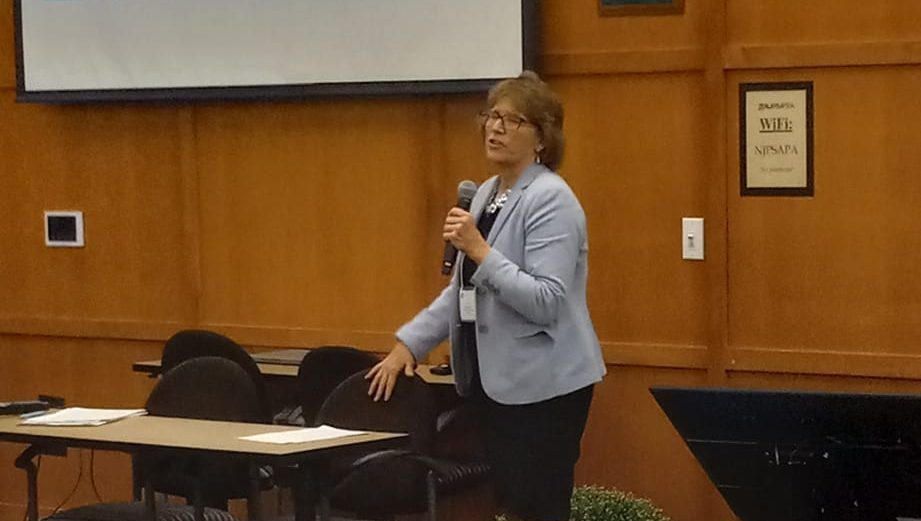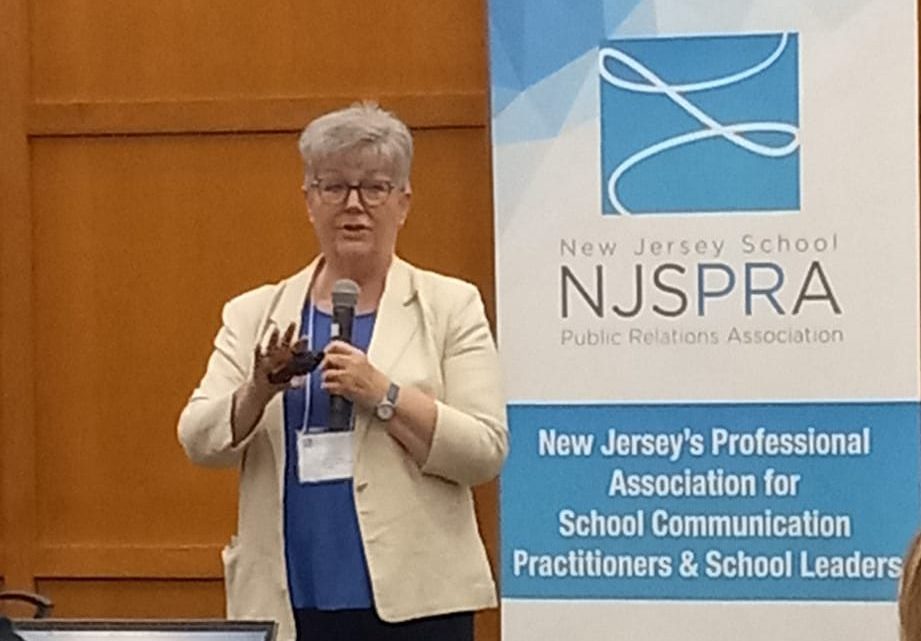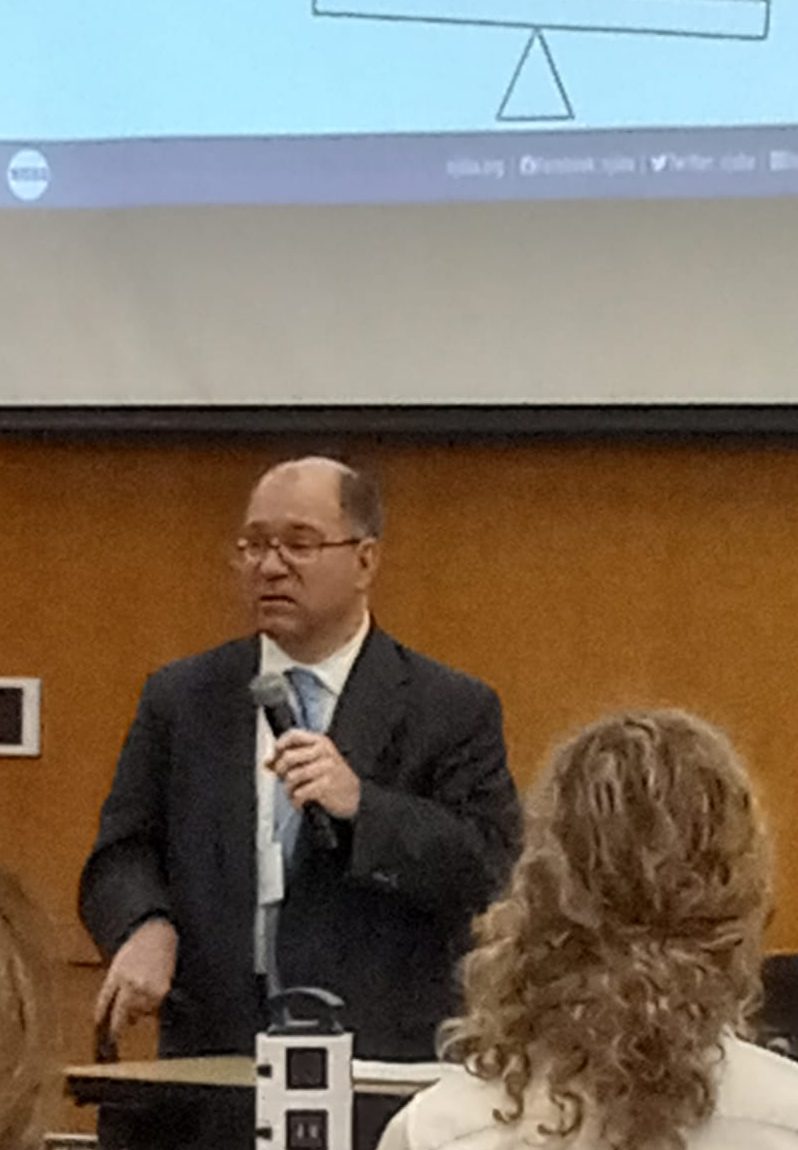By Dr. Timothy Purnell, executive director and CEO, New Jersey School Boards Association
Public relations leaders had the opportunity to hear from the New Jersey School Boards Association’s team on the crucial topic of social media and the freedom of speech during New Jersey School Public Relations Association’s fall Workshop on Oct. 2 at the New Jersey Principals and Supervisors Association’s FEA Conference Center in Monroe Township.

Janet Bamford, chief public affairs officer at the NJSBA, teamed up with John Burns, the Association’s senior legislative counsel; and Mary Ann Friedman, a field service representative, to share best practices in a presentation titled “Board Members, Social Media and Freedom of Speech.”
Bamford began the presentation by reviewing various headlines showcasing incidents where board members found themselves in hot water due to their actions on social media. She posed a central question to attendees: “What can a board member do on social media, and what rights and restrictions do board members have?”
Friedman delved into the First Amendment rights of board members, emphasizing that they still possess these rights but must comply with the regulations set forth by the School Ethics Commission. She highlighted, “Once individuals become board members, they gain access to more information than the average community member.” It is imperative to comprehend the delicate balance of rights for board members.
Burns then discussed how school board members can express their opinions through letters to the editor, provided they remain truthful, clearly state that it represents their personal opinion and identify themselves as school board members. Burns commented, “These guidelines were straightforward until the advent of social media.”

Friedman shared a personal experience when, after a defeated budget, a fellow board member criticized the community for not supporting the board and children on social media. The editor removed her statement that it was her personal opinion, leaving only her board member affiliation. The community was understandably upset, leading to a second budget defeat. Friedman stressed the importance of board members maintaining the trust and confidence of the public and highlighted NJSBA’s efforts to provide ethics training to board members, which has yielded positive results.
Guidance from the School Ethics Commission indicates that members should identify their title as a board member, make it clear they are not speaking on behalf of the board, refrain from sharing confidential information and ensure accuracy in their communications.
Burns pointed out that the School Ethics Commission has found social media to be “quite vexing” due to the challenge of balancing board members’ rights with their role on the board. The SEC suggests that disclaimers may not always be necessary and emphasized the difficulty of navigating this issue.
Friedman stressed the importance of districts designating a contact person for social media and website management. Accurate and timely information should be provided on these platforms, and disclaimers should be used judiciously to avoid confusion between personal thoughts and board member roles.

Burns reiterated the SEC’s commitment to preserving board members’ freedom of speech. He mentioned a case where a board member made offensive remarks about a community member on social media, but the SEC deemed it not a violation and recommended resolving the issue through the ballot box.
Friedman advised board members to exercise caution when replying to communications and urged them to “never reply to all.” Burns emphasized that board members should not use their district-issued emails to express personal opinions. Friedman and Burns also discussed the requirements of the Open Public Meeting Act and New Jersey’s Open Public Records Act.
Friedman shared best practices with board members, including the importance of seeking guidance when unsure about posting content on social media. She emphasized that board members should not be the sole source of information, and the district should communicate official information related to district affairs.
Burns mentioned that the SEC discourages board members from “espousing official policy” in its communications. He cited a case where a board member established a Q&A page about the district, which the SEC deemed a violation of the School Ethics Act.
Friedman suggested that the board president should serve as the spokesperson for the board, and board members should redirect constituent inquiries to the board president. She acknowledged that adjusting to this new chain of command can be challenging for board members.
Burns stressed the importance of effective communication within districts, advocating for proper channels for asking questions and encouraging respectful communication between all parties involved.
Friedman concluded the presentation by providing a sample disclaimer for board members to use. The session concluded with a question-and-answer session.
NJSPRA Workshop Highlights An Array of Other Important Topics
The scores of attendees at the meeting also heard from a variety of other speakers on an array of topics.
- Raymond González, superintendent of Westfield Public Schools, teamed up with his coordinator of school and community relations, Mary Ann McGann, to deliver a presentation titled “Dynamic Duo: Create a Strong Superintendent and District Communicator Working Relationship.”
- Nicholas Diaz, the shared superintendent of Union Township and Franklin Township School Districts (Hunterdon County) and the 2023 NJSPRA Communicator of the Year, delivered a presentation titled “Keep Calm and Let the School Communicator Help.”
- Lori Perlow, the former president of NJSPRA and a communications officer with the Communications Consortium of Haddon Township School District, teamed up with Eshaya Draper, communications officer at Middlesex County Magnet Schools and the vice president of membership at NJSPRA to share “Tech and Design Tips for School Communicators.” Perlow focused on leveraging Canva and Draper focused on the power of newsletters.
- Maren Smagala, district communications coordinator of the North Hunterdon-Voorhees Regional High School District and the vice president of programming and president-elect of NJSPRA, teamed up with scholarship winner Laurene Callander, who is a communications officer with Summit Public Schools, to share lessons learned from a recent National School Public Relations Association meeting.
Learn more about the New Jersey Public School Relations Association.

